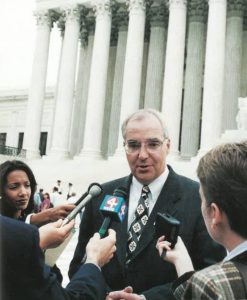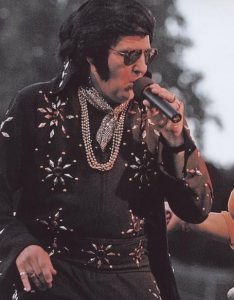Every time James Backstrom ’78 signs his name, he makes sure to include his middle initial so he can remember his father. Clifford Backstrom was a firefighter for more than three decades and passed a duty to serve the public to his son.
In February, the son of Clifford Backstrom will retire just after his 68th birthday after more than three decades as county attorney in Dakota County, Minn., the longest-serving occupant of that post. He’ll step down before the end of his elected term because of health problems – namely, several years of chronic lung infections.
“I feel somewhat limited,” Backstrom said, in an interview. “This is an important job that demands someone who is in better health than I am right now.”
In leaving, Backstrom has a pitch for current and future law students: Work in the public sector.
“Your ability to have an impact on people’s lives will never be greater in any career of law you could choose,” he said. “You have a real chance to make a positive difference in people’s lives – whether as a prosecutor, public defender, or any number of jobs helping make sure people are treated fairly in this society.
“I promise you won’t regret it.”
Backstrom started at William Mitchell when it was a night school with a four-year J.D. program for part-time students, located near the University of St. Thomas campus. He was also among the first students to attend classes on what became the present-day campus.
During his third year, he was hired as a law clerk in the Dakota County Attorney’s office – then hired the following year as an assistant county attorney by John Sonsteng. Sonsteng was county attorney at the time but would soon leave to become a professor at William Mitchell, then Mitchell Hamline (where he still teaches).
Backstrom was appointed county attorney in 1987 to fill a vacancy, then went on to win election to the post eight times. “I would never have become County Attorney without John [Sonsteng] taking a chance on hiring a young, inexperience, but energetic attorney,” he said.
Backstrom points to several highlights and accomplishments during his tenure – from a White House meeting with President Bill Clinton and Attorney General Janet Reno in the 1990s about juvenile crime to creating several diversion programs for low-level offenders to keep them out of jail or juvenile detention. There were also the drug treatment courts he helped create for those with chemical addictions who had committed crimes. “You need support in those times and that’s what we do with treatment courts,” Backstrom said. “We’re trying to give them an opportunity to address the underlying disease of addiction, instead of being locked up for several years, which helps no one.”

James Backstrom speaks to reporters after arguing before the U.S. Supreme Court on Oct. 6, 1998. (photo from William Mitchell Law Winter 1998-99 magazine)
For Backstrom, there’s one case that will “haunt me until I die.” He led the prosecution of Robert Guevara, who was charged with raping and murdering a five-year old girl named Corrine Erstad in 1992. The girl’s body was never found, but it was the early days of using DNA evidence to connect suspects to crimes. Backstrom had such evidence, but Guevara was acquitted, Backstrom believes, in part because of limits in presenting the scientific importance of DNA during trials. Backstrom says he’s grateful the Guevara case ultimately led to those limits being removed. He’s kept a photo of Erstad in his office ever since.
In 1998, Backstrom argued a case before the U.S. Supreme Court – quite a thrill, he said, especially considering he won the case. He argued for the state of Minnesota in a case dealing with proper searches and seizures by police. Arguing for the respondents was Brad Colbert, a then-public defender who now teaches at Mitchell Hamline.
“I think it’s fair to say we were a little nervous,” noted Colbert. “Maybe more than a little.
“Jim did a great job at the argument, although I have to admit I was a little disappointed he did not break out his Elvis impersonation in court.”
Yes, Elvis.

County Attorney Elvis
During his 20th high school reunion, Backstrom recalls being coaxed onto stage to sing an Elvis song (he’d been in choir in high school and was voted the Shyest Boy in his class). To his surprise, he loved it and started finding more opportunities to sing (favorite Elvis song: “Suspicious Minds”). His wife bought him his own Elvis costume for his 50th birthday.
Backstrom sings mostly to seniors at assisted living homes and hopes to do so more in retirement.
For now, though, he’ll focus on his own health and reflect on a long career that started while he was a student at William Mitchell. “I’ve been very privileged to hold this office as long as I have,” he said. “The criminal justice system must always keep improving, and I’m honored to have had many chances to try to do just that.”
Read news coverage from the Star Tribune, Pioneer Press, and KARE 11 about Backstrom’s retirement announcement.
